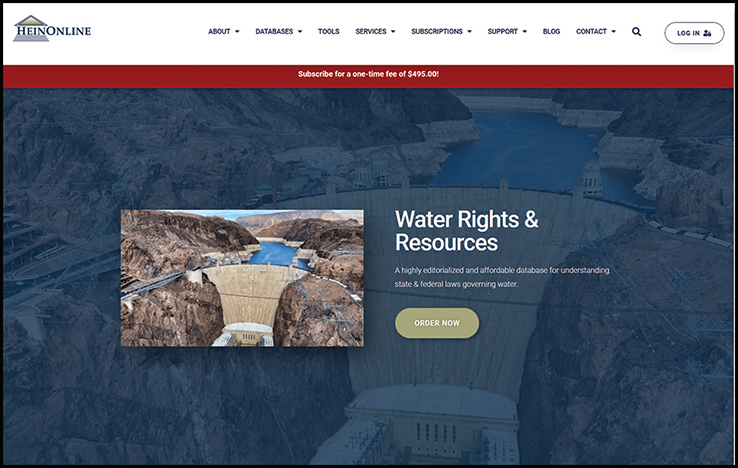HeinOnline’s Water Rights & Resources | eReviews
Part of HeinOnline’s suite of legal-reference databases, Water Rights & Resources provides access to a concentrated collection of resources on the interplay of state and federal laws governing all aspects of water in U.S. society. It is an excellent resource for legal and environmental studies, as well as political science, U.S. history, and related subjects.

Water Rights & Resources
CONTENT Part of HeinOnline’s suite of legal-reference databases, Water Rights & Resources provides access to a concentrated collection of resources on the interplay of state and federal laws governing all aspects of water in U.S. society, including water rights, its quality, regulations regarding the use and protection of it, and more. The collection includes Congressional documents, books, legislative history on major laws, and U.S. Supreme Court briefs on related cases, highlighting documentation on irrigation, hydropower, water conservation, drinking water quality, Indigenous water rights, and other issues across the United States, such as pressures on dwindling water supplies in the American West.
The collection includes 3,015 titles across 3,401 volumes. A dedicated LibGuide is available to assist new users in navigating the collection.
USABILITY Users have the option to search or browse the collection to access materials or can preview the Water Rights & Resources LibGuide to gain insight on best practices for navigating it. The menu provides quick access to browsable lists of documents and reports, including an alphabetical listing of titles in the collection, committee prints, Congressional Research Service and Government Accountability Office reports, Code of Federal Regulations Titles 18 and 33, histories and legislative histories, serials and periodicals, Supreme Court briefs, a bibliography that can be sorted by title or author, and a list of scholarly articles that users can search within or sort by title, author, most cited, and year.
When conducting a basic search, users are prompted to search by keyword or select the option to look for items by author, title, citation, or catalog. Results are displayed in a simple list and include a preview of the content with search terms highlighted. Users can refine results by date, document type, section type, location, title, organization, person, and/or subject and have the option to modify their search or look within results, and to save, download, email, and print results.
Content is provided in searchable PDF format, and users can link to individual pages, access citations, switch to a text-based version of the content, and toggle between different page-view options.
The advanced search provides an additional layer of control for users who desire a targeted approach to their research. Options include the ability to search across multiple fields; narrow by document type, title, or date; peruse the entire HeinOnline catalog (including MARC records); explore by document or case citation; and use the “Fastcase” case lookup option, with additional tools provided for those with a Fastcase subscription.
PRICING Pricing for current HeinOnline customers with an existing Core subscription is $495, a one-time payment that grants perpetual access to the database. Pricing for non–HeinOnline customers is an initial payment of $495, with a $95 annual renewal fee.
VERDICT HeinOnline’s Water Rights & Resources collection provides access to thousands of U.S. legal, federal, and state documents from one easy-to-use database. For both students and legal scholars, the collection is highly browsable and intuitive to search, reducing the challenges involved in accessing legal documents in print. The accompanying LibGuide provides valuable insight into the subjects and documents available, augmenting use of the collection. An excellent resource for legal and environmental studies, as well as political science, U.S. history, and related subjects.—Gricel Dominguez
RELATED
ALREADY A SUBSCRIBER? LOG IN
We are currently offering this content for free. Sign up now to activate your personal profile, where you can save articles for future viewing









Add Comment :-
Comment Policy:
Comment should not be empty !!!